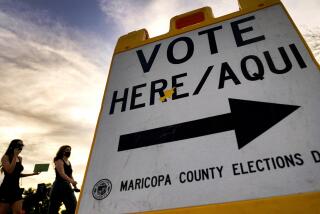Supreme Court upholds tax break for Arizona religious schools
The Supreme Court’s conservative majority opened the door for new state support for religious schools, ruling that special tax credits that pay for children to go to church schools cannot be challenged on constitutional grounds.
The 5-4 decision Monday is a major win for those who support the “school choice” movement and aid to parochial schools, and a potentially far-reaching loss for defenders of strict separation of church and state.
The ruling effectively upholds Arizona’s dollar-for-dollar tax credit, up to $500 per person or $1,000 for a couple, for those who donate to organizations that in turn pay tuition for students attending private and parochial schools. In recent years, as much as 92% of the money went for religious schools’ tuition.
The court’s ruling put an implicit stamp of approval on similar laws in at least six others states, including Florida and Pennsylvania, which offer tax credits for those who support religious schools. And it is likely to encourage other states to do the same because tax credits are more politically acceptable than public aid to religious schools.
Since the 1960s, the high court has invoked the 1st Amendment — which bars the government from promoting “an establishment of religion” — to strike down a series of state laws that sent public money to parochial schools.
The Arizona case began when several taxpayers cited the 1st Amendment to challenge the state’s tax credits. They pointed out that some tuition support groups gave money only to children who attended certain church schools. And their ads told taxpayers they could support a child in a religious school and “it won’t cost you a dime.”
The U.S. 9th Circuit Court of Appeals ruled this approach an unconstitutional subsidy for teaching religion, but in Monday’s decision, Justice Anthony M. Kennedy threw out the entire lawsuit, holding that the objecting taxpayers had no standing to sue.
“When Arizona taxpayers choose to contribute [to a school tuition group], they spend their own money,” he said, not the state’s money. Therefore, others have no right to object, he said. Chief Justice John G. Roberts Jr. and Justices Antonin Scalia, Clarence Thomas and Samuel A. Alito Jr. agreed in the case of Arizona Christian School Tuition Organization vs. Winn.
“That is absurd to say it is their money. It is tax money they owe to the state,” said Paul Bender, the Phoenix lawyer for the objecting taxpayers. “If you give the money to a church school, you get a 100% tax credit. If you can’t object to that, what’s left?”
He and other advocates were surprised in November when the Obama administration’s acting solicitor general, Neal Katyal, urged the court to throw out the suit brought by the Arizona taxpayers.
Justice Elena Kagan, in her first written dissent, spoke for the court’s liberal bloc in saying the ruling “offers a road map — more truly, a one-step instruction” for those who seek public money to aid religion.
Some school choice advocates said the decision would encourage other states to look to tax credits.
“This has quietly become the option of choice” for those favoring state aid for religious schools, said University of Notre Dame law professor Richard Garnett, counsel for the American Center for School Choice. “And this decision is likely to encourage the shift” in favor of tax credits for religious schools, he said.
Attorneys general from 13 states had urged the court to approve the use of “tax incentives” to “increase access to private schools.” They cited laws in Florida, Georgia, Indiana, Iowa, Pennsylvania and Rhode Island that allow tax credits for support of private schools.
The Alliance Defense Fund applauded the ruling. It sets a “national precedent” that “empowers parents. [They] should be able to choose what’s best for their own children,” said David Cortman, the fund’s senior counsel.
The Rev. Barry Lynn, executive director of Americans United for Separation of Church and State, called the ruling misguided and said it “betrays the public school system by directing tax dollars to religious schools. The court has bought into the legal fiction that tax credits are not state aid to private schools.”
More to Read
Sign up for Essential California
The most important California stories and recommendations in your inbox every morning.
You may occasionally receive promotional content from the Los Angeles Times.










